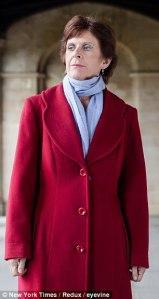
The good professor…
Daily Mail: Americans ‘overreacted’ to the 9/11 attacks, according to the newly appointed first female vice-chancellor of Oxford University. Terrorism expert Professor Louise Richardson said the 2001 atrocity provoked such a response because violent extremism was a ‘new experience’ in the US. Widespread panic ensued in America after al-Qaeda hijacked four passenger airliners and flew them into buildings, causing almost 3,000 deaths.

In contrast, British citizens have shown themselves to be more ‘resilient’ in the face of terror when dealing with violence during the Troubles in Northern Ireland, she said.
Professor Richardson, who lived and worked in the US for many years, said that combating the psychological impact of terror was the best counter measure. She said: ‘The whole genius of terrorism is to have a greater psychological impact.
‘The reason random attacks have so much more impact is that if no-body is chosen, no-body is safe and the fear is much more widespread. I think central to any counter-terrorism campaign should be a resilient population. And I have to say the British population in the course of the Troubles and violence in Northern Ireland proved really quite resilient I think – far more so than the US and the scale of the reaction and overreaction in the US to the 9/11 atrocity. ‘This was a reflection of the fact that this was a such a new experience for the US.’
Irish-born Professor Richardson is an internationally renowned scholar of terrorism and security studies and regularly advises policy makers. Her publications include the ground-breaking study: What Terrorists Want: Understanding the Enemy Containing the Threat. In that book, she admitted she would have joined the IRA ‘in a heartbeat’ aged 14 and had to be stopped by her mother from joining a protest march a week after Bloody Sunday in 1972. She was later invited to join the student branch of the IRA at university, but by then had decided that political violence was wrong.
Speaking yesterday at the British Council’s ‘Going Global’ conference in London, she also addressed the issue of radicalisation at universities. While she acknowledged that there were issues to be addressed, she ‘resisted’ the popular notion that there was an intrinsic link between universities and extremism. ‘I think it’s simple a matter of demographics,’ she said. ‘Violent extremists by and large are young men, predominantly male – and they often congregate in universities.’
And she said that sometimes education could compound a would-be extremist’s sense of disenchantment with society if there are no graduate jobs available. She added: ‘The most combustible combination is an educated workforce but with the kind of economy that can’t allow them to realize their expectations that have been heightened by their education.’
However, she maintained that universities had a vital role to play in helping to combat extremism, through educating young people on controversial issues. As such, she said it was imperative that radical ideas were expressed and challenged in universities and that such institutions should protect that right.
‘Education is the best antidote to radicalisation,’ she said. ‘Any terrorist I’ve ever met in the course of my academic career had a highly over-simplified view of the world – a view of the world [which is] black and white.’
Professor Richardson, who has led St Andrews for more than six years, was nominated to become the first female vice chancellor in Oxford University’s history.
DCG

